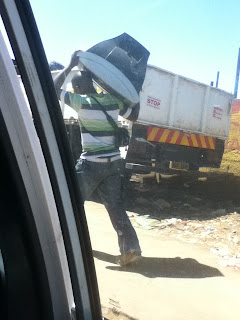Kombis are the main way people get around in Zim, especially in the cities. Mostly Japanese-made minivans, they are designed to seat 15: one row of 4 at the back, three rows of three, and two in the front - but the standard practise is 4 in every row, plus 2-3 more facing backward behind the front seats, seated on the engine console. Children don't get included in the count, as long as they're on someone's lap, so including the conductor it's common to have a couple dozen people crammed in, along with bags of maize, boxes of goods for resale, flats of eggs, fertilizer, plumbing pipe, etc.
The routes are fixed and kombis leave whenever they are full, stopping anywhere along the route to drop off or pick up passengers. The conductors are in charge of finding passengers and collecting money. They hang out the door whistling and calling for business, thumping on the roof for the driver to stop if they spot a customer, thumping on the roof when they're ready to go again. It's not uncommon for kombis to go off-route, especially on a return trip against the rush hour flow, trolling the streets for passengers.
The conductors don't get a seat if there are passengers to fill them; they crouch in the door-well, bent over the outside passenger. Outside Harare writing out passenger tickets seems to be the norm, but this is ignored in Harare. Kombis are a favourite target for police; on the 25 km stretch from Harare to the bedroom community of Chitungwiza (Zimbabwe's third largest city) there are usually around 5 police roadblocks, looking for infractions they can 'spot fine'.
Children are handed to other passengers if the mother already has one or two on her lap. It can be a man or woman, and I've never seen anyone complain; they will help the child eat, clean it's hands after, and generally treat it as they would a niece or nephew.
The conductors at the kombi ranks vie with one another to fill their vehicles first; their is much shouting of destinations, banging on the roof, and teasing and coaxing of possible customers. In very competitive areas they will jump into the crowds and intercept customers as they approach, steering them by the elbow towards their own kombis, and away from the competition's.

































































